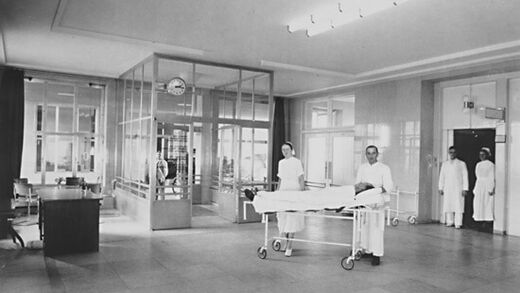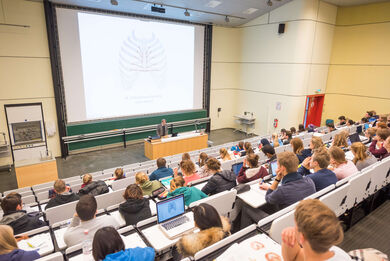Heidelberg University Hospital
Healthcare, research and teaching of international standing
Heidelberg University Hospital is one of the largest and most renowned medical centres in Germany. Every year, around 85,600 patients receive inpatient and day-care treatment in its specialised clinics and more than 1,163,000 patients receive outpatient treatment. Our patients come from the Rhine-Neckar region, Baden-Württemberg, other federal states and abroad.
Treatment across clinic boundaries
In co-operation with hospitals in the region, doctors in private practice and health insurance companies, the University Hospital also implements innovative models in patient care. The hospital and its co-operating facilities in the region offer outpatient and inpatient diagnostics and treatment for all serious illnesses. Modern buildings with perfect technical equipment form the framework for high-performance medicine for sick people.
The Heidelberg Hospital circle
The clinics in Neuenheimer Feld are connected in a circle. At the centre of this Heidelberg clinic circle is a central rest and recreation zone. The hospital ring ensures short distances and bundles most medical specialities within a radius of two kilometres. Since summer 2004, the hospital ring has been gradually expanded: Following the construction of the new medical clinic (2004), patients have been treated in the new paediatric and youth clinic since June 2008. The new Women's and Dermatology Clinic was opened in June 2013 and the Infectious Diseases Clinic in 2018. The new Surgical Clinic building will be completed in 2019 and the hospital ring will be finalised. The Heart Centre planned for 2024 - combining cardiology, cardiac surgery and paediatric cardiology under one roof - will set new national standards. Construction of the Hopp Children's Tumour Centre (KiTZ) is also set to begin in 2021.
Unique in cancer treatment nationwide

The National Centre for Tumour Diseases (NCT) in Heidelberg is a national pioneer in the diagnosis and treatment of cancer, where interdisciplinary treatment has been practised in an exemplary manner under one roof since 2010. Patients with cancer are treated here jointly by qualified experts from various specialities. The close cooperation with the German Cancer Research Centre ensures that new therapeutic approaches are developed and quickly put into practice. Since 2017, there has also been a corresponding counterpart for children suffering from cancer: at the KiTZ (Hopp Children's Cancer Centre Heidelberg), doctors, scientists, nursing staff and other specialists work on new diagnostic and therapeutic options. The KiTZ is a joint institution of the German Cancer Research Centre (DKFZ), Heidelberg University Hospital (UKHD) and Heidelberg University. In November 2009, the Heidelberg Ion Beam Therapy Centre (HIT), the only facility of its kind in Europe, was put into operation under the direction of the Department of Radiation Oncology and Radiotherapy. The HIT is the first therapy centre in Europe to work with both protons and heavy ions. Children and patients with certain tumours of the prostate, lungs and liver can be treated effectively here. Two treatment stations and a research station went into operation immediately in 2009, followed in 2012 by the third treatment station in the "gantry", in which the ion beam now even rotates around the patients. Tumours can now be reached even more optimally for radiotherapy. In close proximity to the head clinic, this new form of radiotherapy can benefit a larger number of patients with previously incurable tumours for the first time.
Passing on medical knowledge
Around 4,450 prospective doctors are currently studying in Heidelberg. In the clinical semesters, they take part in the reform programme Heidelberg Curriculum Medicinale (HeiCuMed), which is at the forefront of medical training programmes in Germany. It offers practice-based training in small groups, which is modelled on successful study programmes at Harvard Medical School in the US.
The Akademie für Gesundheitsberufe (AfG) has been providing training and further education for the hospital and other regional cooperation partners since 2005. The academy offers over 800 training places in twelve training programmes in the fields of nursing and medical-technical assistance as well as in other medical professions. An extensive further education and training programme, which is also available to external interested parties, rounds off the AfG's offering.
The hospital publishes quality data from many service areas every year. In addition to the legally required annual quality reports, further quality data is voluntarily made available to the public, for example on the high-quality care of premature and newborn babies (www.perinatalzentren.org) and - together with other university hospitals in Baden-Württemberg - its own quality indicators.
Together with the Techniker Krankenkasse (TK), comprehensive results on the quality of treatment are also available to all patients on the Internet. This increased transparency is intended to strengthen the relationship of trust between patients and the hospital.





